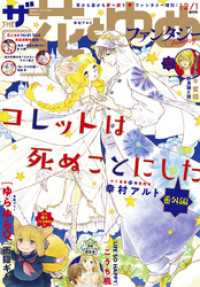- ホーム
- > 洋書
- > 英文書
- > History / World
Full Description
How Maoism Was Made focuses on the history of the early years in China after 1949, featuring new scholarship by academics across Europe and North America. The field of early PRC history has been transformed by the unprecedented accessibility of archives from the 1990s to the early 2010s. Sixteen contributors show how the revolutionary system was built and maintained by the efforts of non-elite actors, including scientists, farmers, designers, artists, cadres, and ordinary citizens. By abandoning the Cold War political work of vilifying or celebrating Chinese communism, How Maoism Was Made aims to render the history of the Maoist system comprehensible to specialists and non-specialists alike, by viewing it through the lens of people who made it. Chinese communism is revealed to be a set of beliefs and practices that inspired millions of people to (re-)build their country and find a new life within it, at times with tragic consequences.
Contents
Introduction: The Early People's Republic of China Between Theory and Practice
Part 1: Society and Political Economy
1: Toby Lincoln: Making a 'New Changsha': Reconstructing China's Devastated City, 1945-1959
2: Benno Weiner: Mediating Disputes, Making Minzu: Minoritization on an Ethnocultural Frontier of Early Maoist China
3: Fabio Lanza: The Political Economy of the Everyday: Theory and Praxis in the Urban Commune
4: Wenyu Jing and Felix Wemheuer: Seeing Like the Maoist State: Peasant Resistance in 1950s Court Documents
Part 2: The Revolutionary Self
5: Aaron William Moore: The Final Revolution Is in Our Hearts: Work and Study in Personal Diaries of the Early People's Republic of China
6: Aminda M. Smith: Brainwashing and World Revolution
7: Sarah Mellors Rodriguez: Constructing the Maoist Sexual Subject: 1950s Hygiene Guides and the Production of Sexual Knowledge
Part 3: Material Culture and Everyday Life
8: Jennifer Altehenger: How to Standardize Life in 'New China': The Case of Furniture
9: Christine I. Ho: Mass Muralism and Mass Creativity in the Early People's Republic of China
10: Zhejiang Xiaoxuan Wang: An Unlikely Moment of Revival? The Return of Gods in Early 1960s
Part 4: Expertise and Revolutionary Epistemology
11: Shellen Xiao Wu: How Geography Won the Battle and Geographers Lost the War
12: Covell Meyskens: Marvelling at a World so Changed': The Three Gorges Project in Mao's China
13: Robert Culp: 'Knowledge is Power': Defining Knowledge and Creating Organic Intellectuals, 1961- 1965
Part 5: Socialist Internationalism at Home
14: Mary Augusta Brazelton: Plagues from the Skies: Bacteriological Expertise in the 1952 Germ Warfare Allegations
15: Nicolai Volland: Soviet Books in Socialist China: Epoch Press and the Making of the Maoist State, 1940-1960
16: Emily Wilcox: The Japanese and Korean Roots of Maoist Dance Education, 1951-52
Coda
17: Juliane Fürst and Jochen Hellbeck: Point Counterpoint: Temporal Interplay in the Soviet and Chinese Revolutions








